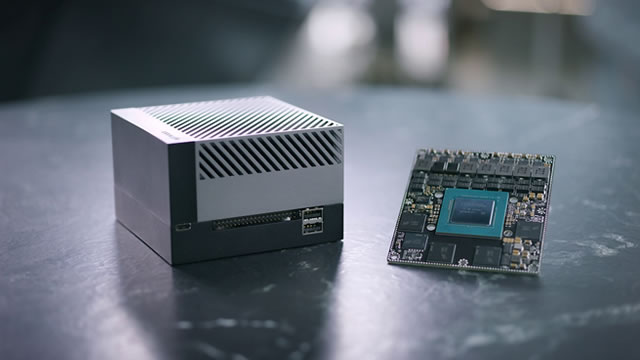Navigating the Trade Tensions: A New Reality for Nvidia Corporation
The US-China trade war has created ripples across various industries, and Nvidia Corporation (NVDA) is no exception. This tech powerhouse, known for its graphics processing units (GPUs) and system-on-chip units (SoCs), has been hit with significant risks due to the escalating trade tensions.
Impact on Sales and Increasing Costs
The trade war has led to increased tariffs on imported goods from China. Nvidia, which sources a significant portion of its components from China, has been affected by these tariffs. As a result, the company has seen a decline in sales, particularly in its data center segment, which relies heavily on Chinese customers. This trend is expected to continue, as the trade war shows no signs of abating.
Moreover, the tariffs have also led to an increase in manufacturing costs for Nvidia. The company has been forced to relocate some of its production outside of China to avoid the tariffs. This shift in manufacturing locations has led to higher costs, as Nvidia now has to pay for transportation and setup costs associated with the new production facilities.
Resilience and Acceleration
Despite these challenges, Nvidia has shown resilience in the face of the trade war. Earnings estimates have seen minor downward revisions, but the company’s EBITDA and free cash flow (FCF) trends suggest otherwise. EBITDA has remained relatively stable, while FCF has seen a slight increase in the past few quarters.
Furthermore, there are signs of acceleration in Nvidia’s shipments. The company’s data center segment, which was previously affected by the trade war, is now showing signs of recovery. This is due to the growing demand for GPUs in artificial intelligence (AI) and data center applications. Nvidia’s new A100 GPU, which is designed for data centers, is expected to drive growth in this segment.
Valuation Adjustments
In light of these factors, analysts have made valuation adjustments for Nvidia. The new price target for the stock is $124.60, down from $161.78. This is due to the increased costs and the uncertainty surrounding the trade war. However, the stock still has upside potential, as the company’s fundamentals remain strong.
Effect on Individual Investors
For individual investors, the trade war’s impact on Nvidia may mean a few things. First, the stock’s price may be volatile, reflecting the uncertainty surrounding the trade war. Second, investors may want to consider holding on to their Nvidia stock, as the long-term growth prospects for the company remain strong. Finally, investors may want to consider diversifying their portfolio to minimize risk.
Effect on the World
The trade war’s impact on Nvidia is just one small piece of a larger puzzle. The trade war has far-reaching consequences, affecting economies, industries, and individuals around the world. For instance, the trade war may lead to a slowdown in global economic growth, as trade tensions disrupt supply chains and reduce business confidence. Moreover, the trade war may lead to a shift in global supply chains, as companies look to avoid tariffs by relocating production outside of the affected countries.
Conclusion
In conclusion, the US-China trade war has created significant risks for Nvidia Corporation, impacting sales and increasing costs. However, the company’s resilience and accelerating shipments suggest that it will weather the storm. Valuation adjustments have led to a new price target and a rating downgrade, but the stock still has upside potential. For individual investors, the trade war’s impact on Nvidia may mean volatility and a need for diversification. For the world, the trade war’s impact on Nvidia is just one piece of a larger puzzle, with far-reaching consequences for economies, industries, and individuals.
- Nvidia Corporation faces significant risks due to the US-China trade war
- Impact on sales and increasing costs
- Resilience and acceleration
- Valuation adjustments
- Effect on individual investors
- Effect on the world





